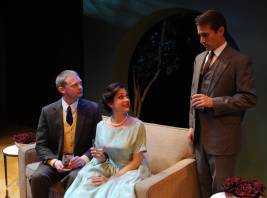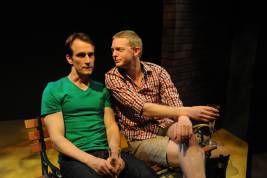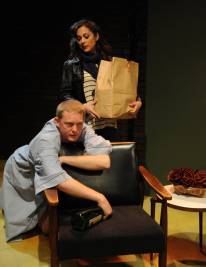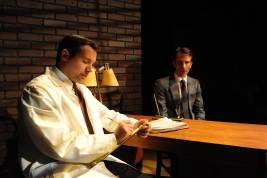
Playwright Alexi Kaye Campbell puts a personal face on Contemporary Gay History in his provocative, daringly constructed, thought-provoking, occasionally hilarious, and profoundly impactful The Pride, the latest offering by San Diego’s Diversionary Theatre, and one of its very best.
 Moving back and forth in time from 1958 to 2008, The Pride recounts the lives of Oliver, Philip, and Sylvia (and of a second Oliver, Philip, and Sylvia), played in both eras by a trio of San Diego’s finest actors—Brian Mackey, Francis Gercke, and Jessica John.
Moving back and forth in time from 1958 to 2008, The Pride recounts the lives of Oliver, Philip, and Sylvia (and of a second Oliver, Philip, and Sylvia), played in both eras by a trio of San Diego’s finest actors—Brian Mackey, Francis Gercke, and Jessica John.
In 1958, we meet children’s novelist Oliver as he is introduced by his illustrator Sylvia to her real estate agent husband Philip, a particularly uncomfortable first meeting for the latter. Does Sylvia think that Oliver might possibly be one of those men? A homosexual?
Fifty years later, a contemporary Philip has just moved out of the flat he’s been sharing with his lover Oliver, much to a heartbroken Oliver’s dismay, and this time round Sylvia is Oliver’s gal pal and confidant.
Two sets of identically named characters whose lives five decades apart could hardly be more different.
1958’s Philip turns out, we soon learn, to be precisely what he most fears being, and the affair he launches into with Oliver leaves him filled with guilt, shame, and disgust. A decidedly-ahead-of-his-time Oliver, on the other hand, wants nothing more than a committed same-sex relationship, of the sort that will become commonplace five decades hence. Caught between the two men, Sylvia finds herself the victim of a society which forces men to marry against their nature regardless of who ends up getting hurt.
 2008 finds our three protagonists living remarkably different lives and facing a whole new set of challenges in a “post-gay” world. Contemporary Oliver seems, on the surface at least, to have exactly what 1958 Oliver longed for, yet is unable to resist the lure of the anonymous sex that his namesake repudiated and which 1958 Philip viewed as his only same-sex option. Neither repressed or depressed, today’s Philip has become an out-and-proud gay man who sees no reason why his homosexuality should make his relationship with Oliver any less monogamous than the heterosexual norm. As for today’s Sylvia, this 21st Century woman has no problem being a gay man’s best friend, but heaven forbid anything or anyone should prevent her from finding love with the proper straight man.
2008 finds our three protagonists living remarkably different lives and facing a whole new set of challenges in a “post-gay” world. Contemporary Oliver seems, on the surface at least, to have exactly what 1958 Oliver longed for, yet is unable to resist the lure of the anonymous sex that his namesake repudiated and which 1958 Philip viewed as his only same-sex option. Neither repressed or depressed, today’s Philip has become an out-and-proud gay man who sees no reason why his homosexuality should make his relationship with Oliver any less monogamous than the heterosexual norm. As for today’s Sylvia, this 21st Century woman has no problem being a gay man’s best friend, but heaven forbid anything or anyone should prevent her from finding love with the proper straight man.
The Pride takes changes in societal mores over the past half century and turns them into particularly fine theater, allowing us to witness the lives of two very different sets of characters at key moments and become invested in their search for happiness. By giving us a mere five scenes per era, Playwright Campbell forces us to connect the dots, to imagine what has happened between scenes, and to look for links between past and present. In other words, audiences can expect to be gripped, to be challenged, and to have much to discuss, both at intermission and following the performance.
 Though The Pride has already been staged in London, New York, and a number of major U.S. cities before its San Diego premiere (trumping Los Angeles, which has yet to see a production), you’d be hard pressed to find a better cast than Diversionary Theatre’s (or a finer director than Glenn Paris), proving once again that for Southlanders in search of world class plays and musicals, an occasional road trip to discover S.D.’s thriving theatrical scene is well worth the drive.
Though The Pride has already been staged in London, New York, and a number of major U.S. cities before its San Diego premiere (trumping Los Angeles, which has yet to see a production), you’d be hard pressed to find a better cast than Diversionary Theatre’s (or a finer director than Glenn Paris), proving once again that for Southlanders in search of world class plays and musicals, an occasional road trip to discover S.D.’s thriving theatrical scene is well worth the drive.
Oliver, Philip, and Sylvia may share the same names in 1958 and 2008, but Mackey, Gercke, and John each get two very different characters to bring to life, brilliantly, and with accents so authentically British-sounding as to make us forget that the trio are as All American as they get.
Having seen the always terrific Mackey in lighter roles in Diversionary’s As Much As You Can and The Little Dog Laughed, I was unprepared for the depth and power of his two Olivers, the passionate visionary with a dream that sets him far ahead of his generation and the sexual compulsive whose urges are painfully at odds with the love he so clearly feels for Philip. Gercke, making his Diversionary debut, is equally sensational as both the achingly repressed 1958 Philip and his 21st Century counterpart, torn between the flawed man he loves and a desire for a relationship without compromises. John follows her recent star turn in Angels In America with a pair of superb performances, as a woman who knows that there’s something seriously missing from her marriage and as her contemporary namesake, unwilling to settle for anything less than everything she deserves in a relationship.
 Completing the cast in a trio of scene-stealing cameos is the marvelous Dangerfield G. Moore, first seen as a cheeky rent boy in Nazi regalia, then as a deadly serious therapist on a misguided mission, and finally as a magazine editor eager for a tell-it-like-it-is article on Gay Life Today. That Moore creates three fully three-dimensional characters—two of them real laugh getters—is a tribute to his acting gifts.
Completing the cast in a trio of scene-stealing cameos is the marvelous Dangerfield G. Moore, first seen as a cheeky rent boy in Nazi regalia, then as a deadly serious therapist on a misguided mission, and finally as a magazine editor eager for a tell-it-like-it-is article on Gay Life Today. That Moore creates three fully three-dimensional characters—two of them real laugh getters—is a tribute to his acting gifts.
Scenic designer Matt Scott has created a classy-looking Act One set which doubles as Philip and Sylvia’s 1958 living room and as Oliver and Philip’s in 2008, backed by a large circular opening which director Paris uses ingeniously as a “portal” from past to present and back. The set then gets cleverly modified for Act Two’s more varied locales, with help from prop designer/set decorator David Medina. Michelle Caron’s outstanding lighting contributes greatly to The Pride’s more dramatic moments, as does Omar Ramos’s striking sound design. Trista Roland’s costumes are both character-defining and period-perfect. Kudos go too to dialect coach Claudio Raygoza. Ryan Heath is stage manager. The Pride is produced by Bret Young. John E. Alexander is executive director of Diversionary Theatre.
If ever there was a Diversionary Theatre production that crossed age, gender, and sexual orientation lines, The Pride is that production. For older playgoers, it will be a trip down memory lane and a reminder of changes experienced in their lifetimes. Younger audience members will find it a real eye-opener to an epoch many can scarcely imagine ever existed, let alone a mere fifty or so years ago. Straight audience members too will find much to identify with in The Pride, and not simply because of Sylvia’s heterosexual presence.
It’s hard to imagine a better, a more powerful, or a more memorable follow-up to the recent Next Fall than The Pride, a play that Diversionary Theatre can be proud indeed to introduce to Southern California audiences.
Diversionary Theatre, 4545 Park Boulevard, San Diego.
www.diversionary.org
–Steven Stanley
April 7, 2012
Photos: Ken Jacques


 Since 2007, Steven Stanley's StageSceneLA.com has spotlighted the best in Southern California theater via reviews, interviews, and its annual StageSceneLA Scenies.
Since 2007, Steven Stanley's StageSceneLA.com has spotlighted the best in Southern California theater via reviews, interviews, and its annual StageSceneLA Scenies.







 COPYRIGHT 2025 STEVEN STANLEY :: DESIGN BY
COPYRIGHT 2025 STEVEN STANLEY :: DESIGN BY